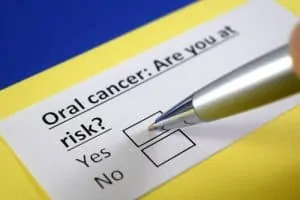
Even though it’s not one of the more discussed cancers, oral cancer is in fact one of the most common forms of cancer in the United States. And the number of those affected continues to grow each and every year. The American Cancer Society estimates that in this year alone, just over 51,500 people will be diagnosed. Additionally, over 10,000 people will lose their lives to the disease. But even though oral cancer is serious and can be fatal, early detection and proactive treatment greatly increases the chance of survival.
Since detecting oral cancer early is key to treating it successfully, we need to be able to recognize the signs. Some of the common early warning signs of oral cancer may include:
A chronic sore that doesn’t go away
Bad breath
Difficulty swallowing or chewing
A lump on the cheek or tongue
Change in voice
If you notice any of these symptoms, see your dentist in El Paso as soon as possible.
Ideally we would all be able to avoid the factors that increase the risk of oral cancer. However, it’s not that simple. Some of the risk factors are uncontrollable, including genetics, age, and gender. However, there are other lifestyle factors that we can control in order to reduce our risk. A short list of both controllable and uncontrollable risks include:
Gender: Men are two times more likely to develop oral cancer than women.
Age: People over 55 are the most affected by oral cancer with the average age of diagnosis being 62.
Tobacco Use: Nearly 80% of those diagnosed with oral cancer are smokers or use smokeless tobacco. Smoking often leads to throat or mouth cancer, and smokeless tobacco usually results in gum, cheek, or lip cancer.
Alcohol: Approximately 70% of all those diagnosed with oral cancer drink alcohol often. And if you’re a heavy drinker and use tobacco, your risk may be as high as 100%.
The best way to protect yourself against oral cancer is to avoid the lifestyle habits that put you at increased risk. Additionally, it’s important to maintain regular dental cleanings and checkups to help catch any problems as early as possible while the chance for successful treatment is greatest. If you haven’t seen a dentist in six months or more, we encourage you to call our El Paso dental office to schedule an appointment today. It could save your life.
He was excellent and pulled my wisdom tooth in less than 2 min. w/o chipping it. The service was good too.
Great dentist experience! While they do take my insurance, unfortunately, they are not part of my network, however, I liked them so much I will continue to see them.
We were very impressed with the helpful and friendly staff at this dental office.
I was very impressed and thankful with the service provided.
I’m 60 years old and I hated to go to the dentist, and put off going for a long time. But let me tell you Dr. Rizk is the best dentist I’ve ever had. I would of gone years ago. A no pain Dr. – thank you!
I frequently talk to my patients about the different types of dental crowns available to restore their teeth. Understanding the different crown materials available helps you make an informed decision about your dental care. Let me share my professional insights about your various crown options and help you determine which... Read More...
As a dentist practicing in El Paso, I often discuss dental crown cost without insurance with my patients. I understand that cost considerations play a significant role in dental treatment decisions, and I believe in providing transparent information about pricing and payment options. The dental crown cost without insurance typically... Read More...